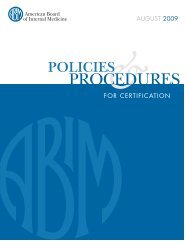The SRA Symposium - College of Medicine
The SRA Symposium - College of Medicine
The SRA Symposium - College of Medicine
You also want an ePaper? Increase the reach of your titles
YUMPU automatically turns print PDFs into web optimized ePapers that Google loves.
Papers<br />
Even if prospective subjects can recall key elements <strong>of</strong> the clinical trial when asked, such recall<br />
may reflect only rote memory with little influence on subjects’ decision making process. For<br />
people with average memories, let alone those patients whose memories may be affected by psychological<br />
stress, emotions, their illness or drug treatments, remembering every piece <strong>of</strong> information<br />
in the consent process would be psychologically overwhelming, making a carefully reasoned<br />
decision virtually impossible.<br />
Better understanding via enhanced consent forms? Because <strong>of</strong> concerns about participants’ ability<br />
to understand the information given to them in the informed consent process/consent form, some<br />
researchers have tried to improve subjects’ level <strong>of</strong> understanding, usually by trying to modify<br />
and improve the consent form. In their review <strong>of</strong> these efforts, Flory and Emanuel (2004) found<br />
that enhanced consent forms didn’t significantly improve participants’ understanding—but more<br />
person-to-person contact by a study team member or neutral educator did improve understanding.<br />
As they note, much <strong>of</strong> the “enhanced” research has emphasized the consent form, although<br />
the informed consent process includes both conversational and written components. While they<br />
noted that this research varied in terms <strong>of</strong> methodologies and measurement instruments, they did<br />
not explore the psychologically relevant issues <strong>of</strong> instrument validity and reliability. If measures<br />
<strong>of</strong> consent form comprehension were not developed with an awareness <strong>of</strong> validity and reliability<br />
issues, the findings from those studies are scientifically meaningless.<br />
Similar conclusions were reached by Campbell, Goldman, Boccia, et al (2004) who compared informed<br />
consent information recalled via four presentations: 1) original written forms, 2) enhanced<br />
print—simpler language, topic headings, pictures, 3) narrated videotapes, 4) self-paced Power-<br />
Point laptop presentations with bullet points, picture, and narration. <strong>The</strong>y found no overall differences<br />
in the amount <strong>of</strong> information recalled, but did find recall improvements with the enhanced<br />
print version for subjects with 8th grade or lower reading comprehension scores. But the links<br />
between memory, understanding, and decision making are presumed, not proven.<br />
Over the past 20 years, Paul Appelbaum and his colleagues (Appelbaum, Roth, Lidz, 1982; Appelbaum,<br />
Roth, Lidz, et al 1987) have written extensively about “therapeutic misconception” in<br />
clinical trials—the mistaken belief held by many patients that research projects will directly benefit<br />
them. A recent study (Appelbaum, Lidz, and Grisso, 2004) found about 30% <strong>of</strong> participants having<br />
inaccurate beliefs about the degree <strong>of</strong> individualized treatment they would get in a clinical trial;<br />
about 50% had unreasonable beliefs about the benefits <strong>of</strong> being in a clinical trial. <strong>The</strong>se researchers<br />
have consistently suggested that the informed consent process include specific information to<br />
patients so that they do not believe that a clinical trial is just another form <strong>of</strong> treatment. One possible<br />
way to address these issues is to have a summary (see Table #1) <strong>of</strong> how research differs from<br />
treatment that can be discussed with patients during the informed consent process.<br />
108 2005 <strong>Symposium</strong> Proceedings Book

















